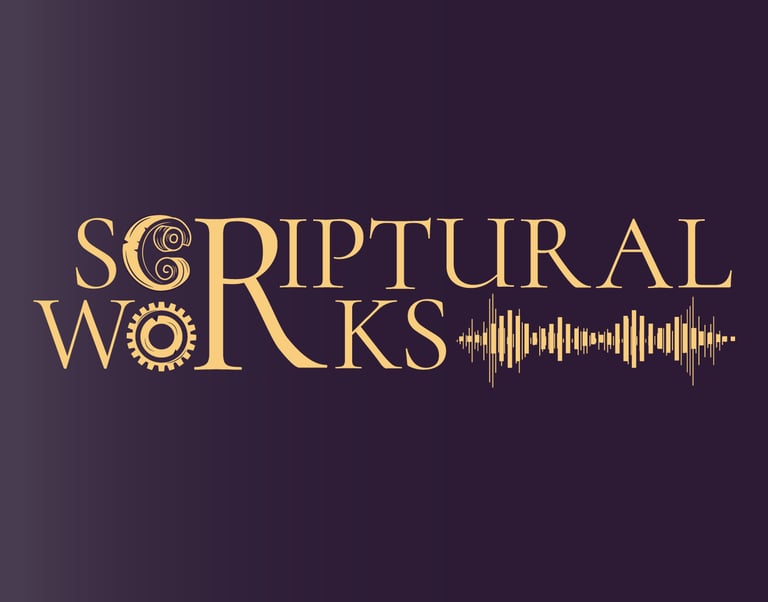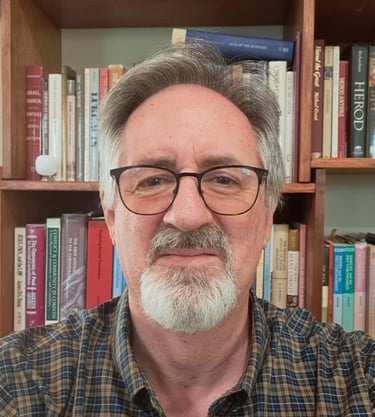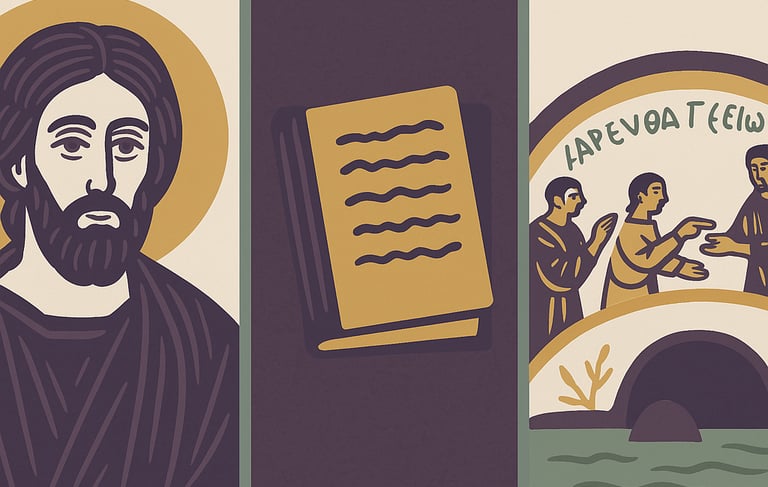
SCRIPTURAL WORKS
Interpretive Strategies and Insights: From Ancient Texts to Contemporary Meaning
Co-hosted by Greg Camp and Patrick Spencer
Exploring Scripture Together
Hosted by two biblical scholars with diverse career backgrounds, Greg Camp (Sheffield University, Ph.D.) and Patrick Spencer (Durham University, Ph.D.), Scriptural Works focuses on a dynamic exploration of how to read and interpret scripture for greater meaning in today's postmodern world.
Whether you're a curious reader, a minister seeking fresh perspectives, or anyone interested in developing a deeper grasp of scripture, Scriptural Works provides the intellectual tools and practical approaches to make biblical texts more accessible and meaningful.


Stereotyped "Huckster" Women at the Center of Acts 16 and Joshua 2 | Dr. Patrick Spencer
EPISODE 17
Lydia isn't the triumphant businesswoman we've made her. To ancient audiences, she arrived pre-loaded with suspicion: a Lydian (ethnic code for deceptive) purple merchant (trade associated with fraud and contamination). Dr. Patrick Spencer points out that she had to beg Paul's group to enter her house—and they only show up there at the episode's end. The slave girl? Exorcised because Paul was annoyed, then discarded by the narrative entirely. No liberation follow-up; she went from profitable to worthless overnight. The jailer pivots from torturer to wound-washer in hours. Luke's pattern is clear: the "wrong" people become the church's foundation. Add the Rahab intertext from Joshua 2—another ethnically suspect woman in a compromised trade, marked by colored thread—and Acts 16 becomes less a conversion blueprint than a systematic dismantling of who counts as respectable.
Latest Podcasts

God's Acts for Israel, Gentiles, and Christians: A Theology of Acts | Dr. Joshua Jipp
EPISODE 16
Joshua Jipp's new volume God's Acts for Israel, Gentiles, and Christians represents fifteen years of scholarship on Luke-Acts. In this conversation, Jipp argues that Acts isn't a church-planting manual but a narrative where God acts and humans scramble to interpret. Divine activity is never obvious—Peter at Cornelius's house is confused, annoyed, moving forward without a roadmap. Luke subverts ancient stereotypes: Roman centurions pray devoutly, Maltese "barbarians" in Acts 28 outdo everyone in kindness, and the early church's economics deliberately reject Pharaoh's extractive model. Hospitality threads it all together—the Emmaus disciples only recognize Jesus after offering shelter to a stranger. For Jipp, Luke-Acts doesn't let you observe from a distance; it puts you in the dock and demands a response.

How Acts 27 Forms Christian Imagination Through Ancient Echoes | Dr. Amanda Jo Pittman
EPISODE 15
Acts 27 becomes a tense case study in leadership, risk, and solidarity in this Scriptural Works conversation with Amanda Jo Pittman. She treats the shipwreck not as background scenery but as a narrative that drills into bodies under stress—seasick, sleep-deprived, hungry—and reveals what people actually trust when control is gone. Paul emerges as a “reverse Jonah” who refuses to treat anyone on board as expendable, pushing for everyone to stay together and share food instead of turning to scapegoats or quick violence. The episode asks how communities today might learn from this storm-tested voyage to act with clarity, protect the vulnerable, and resist the impulse to save face by throwing someone overboard when pressure and panic hit hard.

Ananias' Fatal Real Estate Transaction: Ananias and Sapphira (Acts 5) | Dr. Stan Helton
EPISODE 14
Ananias and Sapphira don’t just fudge a pledge; they stage a sleek little con in the heart of a Spirit-filled community, and their bodies hit the floor as a warning to anyone who treats holiness like branding. In this conversation, Dr. Stan Helton traces Acts 5 back to Achan’s theft in Joshua, where what is “devoted” becomes deadly when secretly reclaimed. They wrestle with divine violence, fear that purifies instead of repels, Sapphira’s own moral agency, and how respectable church generosity can still be shot through with image management, hidden idols, and lies we tell to protect our money, our comfort, our platforms, and our carefully managed religious reputation—a stewardship text with teeth that still bites modern churches and dares listeners to ask where that same lie still lives in their own churches.

When the "Mad" Believed and the Faithful Struggled (Acts 12) | Dr. Patrick Spencer
EPISODE 13
Acts 12 isn't only Peter's story—it's also Rhoda's. This episode explores how Luke inverts expectations through a marginalized enslaved girl who becomes the only person of genuine faith in the narrative. While the praying church dismisses her as "mad," Rhoda recognizes Peter's miraculous deliverance and responds with joy. Dr. Patrick Spencer unpacks the spatial choreography (prison to street to gate), intertextual connections with Exodus and Luke's prayer passages, and the deliberate echo between Rhoda and Paul (both called "mad" for speaking truth). Peter fails the Passover test by falling comatose instead of staying alert. Divine power opens iron gates, but human disbelief keeps wooden doors closed. This deep dive reveals Luke's sustained pattern: marginalized characters appear, exhibit exemplary faith, then disappear—just as they would in society—while powerful insiders fumble in unbelief.

When Your Enemy Saves Your Life | The Good Samaritan Reversal | Dr. Cliff Barbarick
EPISODE 12
Biblical performance critic Cliff Barbarick upends traditional interpretations of the Good Samaritan parable, arguing readers/ listeners should identify with the bleeding victim in the ditch—not the Good Samaritan. Drawing on Robert Funk's 1960s reading, Barbarick reveals how Luke weaponizes this story against the powerful, demanding they embrace vulnerability and accept help from their despised enemies. The Samaritans weren't just marginalized—they were hated adversaries with centuries of bloodshed between them. This isn't about charitable do-goodism; it's about self-emptying as salvation. Barbarick traces this radical theme through Luke's gospel, connecting it to the man with dropsy (whose disease symbolizes the wealthy's deadly hoarding) and challenging modern readers to identify their own enemies and imagine receiving care from them. Ancient text, still challenging.

Gender-Bending Ethiopian Eunuch Shatters Religious Boundaries | Dr. F. Scott Spencer
EPISODE 11
Biblical scholar Dr. F. Scott Spencer discusses his research, which dates back more than 30 years, on the Ethiopian eunuch passage in Acts 8. Spencer explains how he pioneered applying social science criticism, feminist hermeneutics, and literary analysis to this marginalized character. He explores the eunuch's intersectional identity—African, wealthy, religiously interested in Judaism, yet sexually marginalized—arguing that Luke intentionally focuses on the eunuch's status to challenge binary gender norms. Spencer connects the passage to the suffering servant in Isaiah 53, suggesting the eunuch sees himself in this "cut" and shamed figure. He also draws fascinating parallels between the eunuch and the female lover in the Song of Songs, highlighting how the Bible creates space for unusual characters outside traditional family structures.

The Digital Theological Library | Dr. Thomas E. Phillips | Ep. 10
EPISODE 10
Dr. Thomas Phillips founded the Digital Theological Library (DTL) in 2016 to address the critical problem of small seminaries lacking adequate research resources due to the prohibitively high cost of acquiring essential academic books and journals. By creating a innovative co-owned digital collection, over 100 seminaries worldwide now share access to 1.5 million volumes and 120 million articles at a fraction of individual licensing costs. The DTL operates separate specialized libraries for developed and developing nations, plus individual access for religious professionals at affordable monthly rates. To date, DTL has systematically digitized 17 complete seminary libraries totaling 250 tons of physical materials. In addition, through DTL Press, he publishes open-access textbooks using AI-assisted authoring and automatic translation into multiple languages, aiming to reduce educational inequality between institutions worldwide.

How Looking Back Engenders a New Beginning in John | Dr. Patrick Spencer
EPISODE 9
John 21's complex literary structure creates deliberate narrative disruption through its "double ending”—first concluding at 20:30-31, then restarting with "after these things," creating a "blank" in reading. Dr. Spencer analyzes key intertextual elements including the charcoal fire that echoes Peter's denial scene (18:18) and transforms it into a restoration location, threefold love questioning that reverses the threefold denial pattern, fishing imagery contrasting with shepherding commission that recalls John 6 and 10, and recognition scenes paralleling Mary Magdalene and Thomas encounters in chapter 20. The narrative artistry employs two different Greek words for "fish" to create deliberate response linking to John 6's Eucharistic discourse, traces Peter's characterization arc where he never truly "follows" Jesus until 21:19's final commission, and transfers the patron-broker-client relationship from chapter 15 to Peter as new "good shepherd."

Climactic Commission: Narrative Analysis of Matthew 28 | Dr. Greg Camp
EPISODE 8
Dr. Greg Camp explores Matthew's Gospel ending through narrative criticism, examining how "the end is the beginning" functions structurally and thematically. Greg argues Matthew presents Jesus as authoritative teacher, with the Great Commission's imperative being to "make students" who learn Jesus's teachings about law, kingdom, and righteousness. He demonstrates how the ending connects to the opening through authority themes, showing Jesus as completion of Israel's story—surpassing Moses, David, and the prophets. The discussion reveals Matthew's use of Hebrew Scripture citations and geographic symbolism presenting Jesus as faithful Israel who succeeds where the nation failed. Greg challenges traditional missionary interpretations, arguing "going" is daily life rather than calling, focusing on teaching Jesus's comprehensive approach.

Fear, Silence, and Ancient Secrets in the Ending of Mark | Dr. Stanley Helton
EPISODE 7
Dr. Stanley Helton explores Mark's Gospel ending variants: the abrupt 16:8 ending, shorter ending, and longer ending (verses 9-20). He argues Codex Sinaiticus and Vaticanus aren't independent witnesses but share Caesarean exemplars. Through statistical analysis of Origen's citations, Helton demonstrates the 3rd-century scholar likely knew all three endings. He contends Mark originally ended at 16:8, with later additions providing narrative closure. Early translations suggest two publication rounds—first without, then with the longer ending added. The longer ending synthesizes other Gospel material rather than preserving original Markan content. Helton emphasizes textual criticism seeks the earliest recoverable form, not original authorial intent. His work challenges assumptions about manuscript independence and demonstrates early textual fluidity.

How the Ending of Acts Completes Paul's Makeover | Dr. Thomas E. Phillips
EPISODE 6
Dr. Thomas E. Phillips discusses his research on Paul's "rehabilitation" in Acts and how Luke transformed the apostle for a new audience. Phillips argues that Luke presents a dramatically different Paul than the one found in the apostle's authentic letters. While Paul's letters reveal an antagonistic figure who fought with Peter and James, Acts transforms him into a subordinate witness who compromises on circumcision and defers to apostolic authority. This makeover was necessary because Christians in Asia Minor weren't impressed with the historical Paul they knew from his conflicts with key church leaders. Acts completes this rehabilitation project by ending in Rome, with Luke shifting the narrative from Jerusalem's temple to household-based Christianity and essentially ending the Jewish mission while legitimating a Gentile church.

Re-reading Luke-Acts' Characterization in Codex Bezae (Part 2) | Jenny Read-Heimerdinger
EPISODE 5
Dr. Jenny Read-Heimerdinger reveals how Codex Bezae preserves an earlier, more Jewish version of Luke-Acts than our modern translations. The textual critic demonstrates that Bezae's variants aren't later scribal additions but authentic early traditions using Jewish interpretive techniques like reenactment rather than Christian typology. Heimerdinger shows how Bezae portrays gradual understanding—disciples don't immediately comprehend Jesus but develop recognition through stages. Her reading reshapes key characters: Peter becomes "Cleopas" reflecting his role as emerging high priest, Paul struggles with inconsistent views on Jewish law, and Barnabas emerges as the reliable voice Luke supports over Paul's conflicted theology.

Road to Recognition in Luke 24 | Dr. Joel B. Green
EPISODE 4
Dr. Joel B. Green discusses Luke 24's sophisticated narrative structure as both climactic ending and transitional bridge. The renowned biblical scholar explores how Jesus taught Scripture on the Emmaus road by revealing a sweeping pattern throughout Israel's history—glory through suffering. Green emphasizes how the unnamed companion invites readers into Luke's story, experiencing transformation from confusion to recognition. He argues that Luke 24 demonstrates how true understanding comes from seeing Scripture's whole narrative, not isolated passages, with recognition naturally leading to witness.

Re-reading Luke-Acts' Characterization in Codex Bezae (Part 1) | Jenny Read-Heimerdinger
EPISODE 3
British linguist Dr. Jenny Read-Heimerdinger's groundbreaking research on Codex Bezae challenges fundamental assumptions in biblical textual criticism. Through discourse analysis and deep study of this fifth-century manuscript, she reveals it preserves authentically Jewish elements of Luke-Acts that were later removed as Christianity separated from Judaism. Her work suggests the so-called "Western text" isn't corrupted with additions but actually closer to the original, while the standard Alexandrian text used for modern Bible translations represents a later "de-Judaized" version—a substantial paradigm shift for the field.

How Ancient Christian Writings Became Scripture
EPISODE 2
This episode explores the fascinating evolution of early Christian writings from ordinary letters to sacred scripture. It examines how texts gained biblical authority through apostolic connections, community acceptance, and theological criteria. From Paul's earliest letters to contentious council debates and Marcion's heretical challenge, the journey reveals the remarkable intersection of divine guidance and human decision-making that shaped Christianity's authoritative canon and continues to influence scriptural interpretation and faith communities worldwide today.

Sacred Words, Scribal Hands: Drama of New Testament Textual Criticism
EPISODE 1
This episode rips open the hidden world of New Testament textual criticism, where the dramatic discovery of Codex Sinaiticus shattered traditional assumptions about biblical texts. Explore how thousands of competing manuscripts expose fierce theological battles and scribal manipulations while challenging simplistic views of biblical authority. From missing endings to inserted Trinitarian formulas, these textual variants reveal the messy human fingerprints all over our "divine" scriptures—forcing us to confront uncomfortable questions about what we really mean when we say "Bible."

Recent Articles
Who Are We


Greg (Ph.D, Sheffield) is a respected Matthean and rhetoric scholar whose research illuminates the persuasive literary techniques in biblical texts. For his doctoral studies at Sheffield, he studied under renowned biblical and classical scholar Loveday Alexander and brings a broad methodological approach to the interpretation of ancient texts. Dr. Camp served nearly 30 years at Fresno Pacific University, including roles as Professor of Biblical and Religious Studies and Associate Dean.
Now Professor Emeritus, he continues his scholarly work while serving as Interim Pastor at Kerman Bethany Lutheran Church, where he combines academic rigor with pastoral insight to make ancient texts accessible and relevant for contemporary faith communities. His background in both academic theology and practical ministry gives him a unique perspective on how biblical authority functions across different contexts.


Patrick E. Spencer
Greg Camp
Patrick (Ph.D., Durham) is focused on narrative, reader-response, cognitive, and rhetorical criticisms and their applicability to early Christian literature as well as the hermeneutical appropriation of biblical texts in the postmodern world. In addition to authoring Rhetorical Texture and Narrative Trajectories in the Lukan Galilean Speeches (LNTS), Patrick has published various articles in peer-reviewed publications that include JSNT, NovT, CBQ, CBR, SCJ, and others.
Beyond academia, Patrick is the SVP of Marketing and Industry Research for a cybersecurity company in Silicon Valley and has served as the editor in chief for CIO Digest that won over 30 editorial and creative awards. Podcasting is not new to Patrick, who has founded and overseen several successful podcast shows—including the Symantec Podcast, Inside AppSec, and Kitecast. For more information, visit his Academia webpage.
Newsletter Signup
Get notified when new podcasts and articles are published




